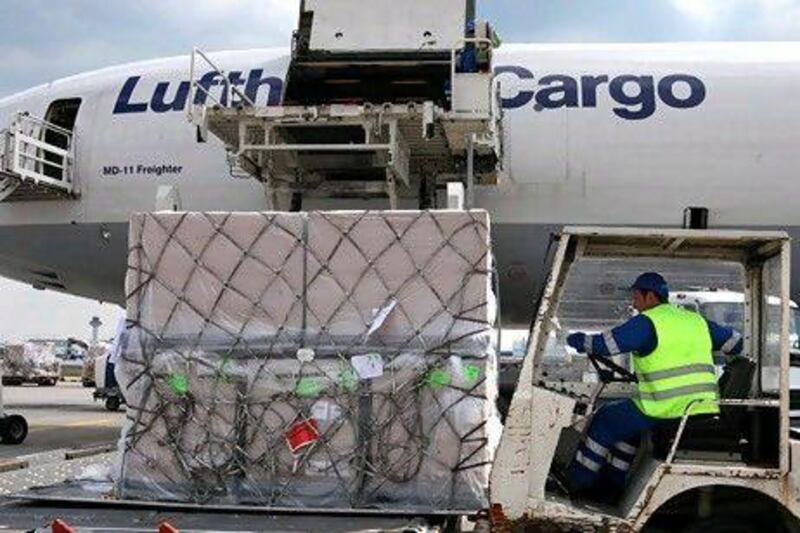The decision by a German federal court banning all night flights from Frankfurt airport, one of Europe's largest hubs, is a blow to Lufthansa, the national carrier. It also bodes ill for Germany's competitiveness as a business location and will benefit rival airports and airlines, including Etihad Airways and Emirates Airline.
The federal administrative court ruled in favour of residents who had complained about night-time aircraft noise. It withdrew permission for Frankfurt, Lufthansa's home airport, to operate 17 flights between 11pm and 5am. It also reduced to 133 from 150 the number of flights allowed in the "shoulder hours" - 10pm to 11pm and 5am to 6am.
The move is particularly damaging to Lufthansa's lucrative cargo business, which the airline said would now lose €40 million (Dh192.7m) of profit per year.
The company cannot easily transfer cargo flights to other airports - such as Cologne/Bonn airport further north - that allow night-time takeoffs and landings, because much of the freight reloaded at Frankfurt is transported in the holds of passenger aircraft scheduled to land and take off from there. Christoph Franz, the chief executive of Lufthansa, said the ruling was good for Lufthansa's rivals in Paris, London, Amsterdam and Dubai, which all allow night-time flights, and that Germany's export industry had just had "its wings clipped".
His anger is understandable, given that Lufthansa cannot afford any more setbacks. Its operating profit slumped by 50 per cent to €734m last year, and its return on sales, at 3.4 per cent, is far below its target of 8 per cent.
Its labour costs are too high at 23 per cent of sales, and its most recent acquisitions are losing money. It also needs to invest €17 billion in the next six years to modernise its ageing fleet so that it can keep up with the new planes put into service by Gulf rivals that are attracting passengers from Lufthansa in the all-important long-haul business, which remains Lufthansa's earner.
It comes as no surprise that Mr Franz is a vocal critic of the European expansion drive being undertaken by Etihad, Emirates and Qatar Airways. He has not shied away from calling for outright protectionism to shield Lufthansa.
Last month, he urged the German government and its partners in the European Union to impose a "capacity limit" on Gulf airlines to curb the growth in their passenger numbers on flights from Europe to Asia. Emirates has tried and failed to secure more landing slots, and has responded by announcing it will fly larger aircraft to German airports in a move that could allow it to boost the number of seats by up to a third. Etihad, which last year became the biggest shareholder in Air Berlin, Germany's second-largest airline, has similar plans.
Mr Franz argues that Gulf airlines are distorting competition because they enjoy state subsidies. But Lufthansa effectively gets subsidies as well. Its purchase of Austrian Airlines (AUA) in 2009 was sweetened by the Austrian government, which took on €500m of AUA's debt.
Lufthansa is launching yet another cost-cutting drive to boost efficiency. And Frankfurt airport could lose cargo business to Paris and Amsterdam. Dubai, too, has huge freight-handling capacities and may benefit.
Fraport, which runs Frankfurt airport, expressed relief that the court did not require it to close its fourth runway, which opened only last October and had also been a focus of demonstrations.
This is the latest in a series of instances of public resistance thwarting or at least delaying major infrastructure projects in Germany. A €4.3bn project to modernise the hopelessly outdated train station in Stuttgart was obstructed by mass protests, and the deepening of the Elbe River to allow bigger ships into the port of Hamburg is on hold because of legal complaints from environmental campaigners.
The government's ambitious plan to boost renewable-energy generation also risks being foiled by countless local campaigns against the construction of overland power lines with tall masts.
A strong trend has become evident in recent years. German citizens, usually disciplined and orderly, are becoming more politically active and litigious, launching petitions, protests and lawsuits to get building work stopped.
It is an indication of how prosperous the country has become - people are taking their prosperity for granted and are more concerned about noise pollution, saving trees or bats than about an economic future they see as secure.
Regional politicians know that backing such campaigns can win them votes. After the court decision on Frankfurt airport, Hannelore Kraft, campaigning for re-election as governor of the big state of North Rhine-Westphalia next month, pledged to ban night flights at Cologne/Bonn airport. And residents near Berlin's new Willy Brandt airport, due to open in June, hope their campaign to ban night flights there will get a boost.
An industrial economy needs a modern infrastructure to keep growing, and that, unfortunately, involves putting up with noise, chopped-down trees and unsightly concrete. The "Not in My Back Yard" mentality poses a risk to the country's prosperity - and Germany's competitors should be rubbing their hands.





